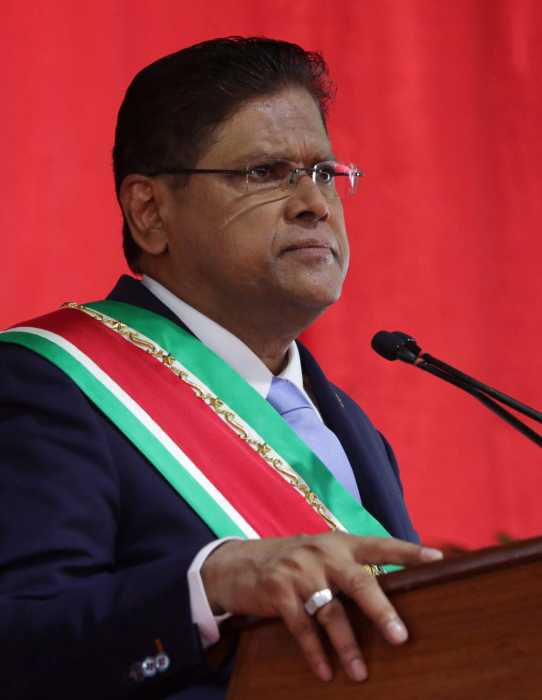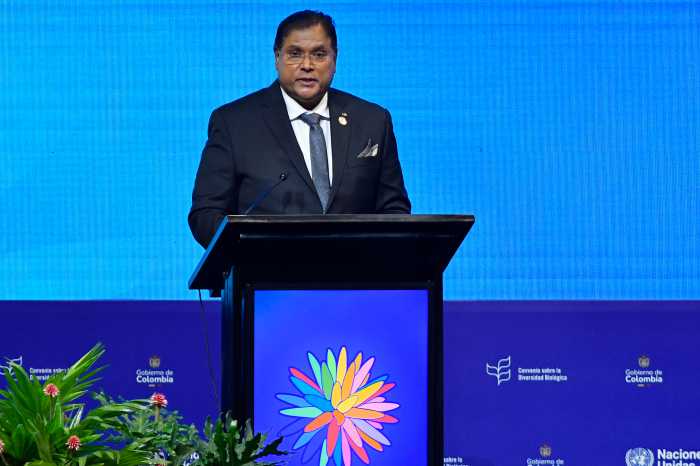One of the best known personalities in Caribbean Community politics is fighting hard to stay out of jail. Surinamese President Desi Bouterse who led two coups in 1980 and 1990, has along with about 20 other defendants been summoned to appear before a war court at month end to learn of the date when he would most likely be sentenced to 20 years in jail for mass murder.
On Dec. 8, 1982, soldiers rounded up 15 critics of his then military-led government, pushed their backs against the walls of an old Dutch fort, and executed them, triggering outrage throughout the hemisphere.
The 15, including four journalists, academic, labor leaders and clergymen, were accused of conspiring with local and western counter revolutionaries to reverse the February 1980 coup that had toppled the elected administration of Henck Arron, the country’s first prime minister after independence from The Netherlands in 1975.
The defendants including former military officers and civilian counterparts have been on trial since 2007 but the court this week indicated that it is about ready to name a date for sentencing. The court has already recommended that the two-term president seeking a third in elections already set for late next May, should be jailed for 20 years for his leading role in the executions.
Bouterse, 74 last month, has persistently and vehemently denied giving even a single individual order to execute anyone on that fateful night back in the 80s, but has publicly admitted political and collective responsibility for the killings.
Late labor leader Fred Derby had said he was “the only one allowed to walk away” from the rifles of soldiers at the fort, ironically located right next door to the cabinet and presidential office as well as the presidential palace in downtown Paramaribo.
The court of justice by letter this week, ordered all the remaining defendants to appear before judges on Nov. 29 when further instructions on the way forward will be handed down. This includes an exact date for sentencing.
Irwin Kanhai, Bouterse’s lead attorney last week lost in a bid to have the sentence thrown out without any punishment because a full year has passed and no sentence had been handed down despite the fact that the main parts of the trial had concluded.
Two of the 25 indicted for mass murder have since died, a few have been freed but the majority including the head of state are now nervously awaiting sentencing.
Lawyers like Hugo Essed for surviving relatives, have said that there is no law that could stop Bouterse and the others from heading to jail if the court so rules despite the fact that he is president of the republic. Parliament had months back passed an immunity law but Essed argues that this will be invalid.
“Failure to close is currently being abused and this abuse cannot be used to wait a year and not to perform any procedural action. Moreover, there is no prospect of a date of the judgment,” said Kanhai last week. The judges disagreed.
The result is that the court could hand down its sentence any day it chooses. Widespread speculation is that the judges could drop it on him and other defendants at a time when it could hurt and hinder his third term campaign ahead of elections in late May.
Like neighboring Guyana which will likely become an oil producer in December, next year’s polls are being regarded as the mother of all elections as the country is also expected to find large amounts of oil. Most of Guyana’s large offshore oil fields are just across the border with Suriname. Expectations there are high that the country will also cash in and whichever party wins will likely control the nation for years to come.
The battle to keep the head of state in office comes as several political parties are negotiating with each other to form coalition groups to prevent Bouterse’s mass based National Democratic Party (NDP) from winning a majority of 26 of the 51 seats, allowing him to form the next government.
The pack includes the Hindustani VHP party and ABOP, representing proud Maroons living in the southeast near the French Guiana border. Suriname is the second to last nation to join the 15-member Caribbean trade bloc. Haiti is the last back in 2002. The two are the only ones that are non English speakers.

























